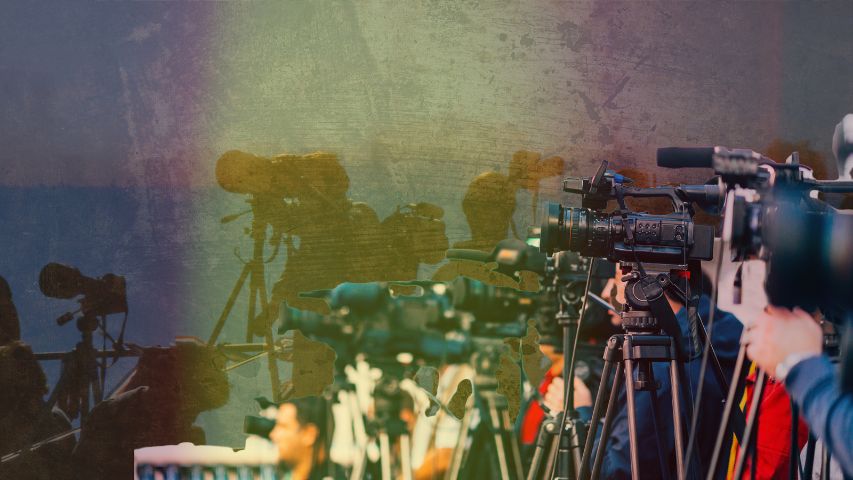-853X543.jpg)
TIGHTROPE WALK FOR JOURNALISTS IN THE MAINSTREAM
by Vinta Nanda December 3 2023, 12:00 am Estimated Reading Time: 7 mins, 28 secsHere, taking off from a few discussions at the Orange City Literature Festival she attended, Vinta Nanda looks at ‘ethics in journalism’ closely to figure out what are the most troubling factors of the day.
The fifth Orange City Literature Festival in collaboration with the Raisoni Group was a terrific experience. Dr Mrunal Naik, the director of the festival, along with her team, curated powerful discussions between participants from several walks of life - history, sports, cinema, television, streaming platforms, politics, religion and mythology – and the speakers included stalwarts like Devdutt Patnaik, Bharat Dabholkar, Nandita Puri, Geetika Tyagi, Avanti Sopori, Janhvi Samant and Siddharth Kak - he was there to showcase his book Love, Exile, Redemption: The story of the last Pandit Prime Minister of Kashmir and his English wife.
Two things caught my attention in this three-days-long celebration of literary works, publishers and authors. One was a panel discussion on writing for film, television and streaming platforms, moderated by Smita Sharma, who was in a conversation with the filmmaker and stand-up comedian Anirban Bhattacharya, author and theatre actor Vikas Khurana, actor and author Kulpreet Singh and author and journalist Nandita Puri. I was amused when Kulpreet Singh asked the audience (over 200, mostly students), what their favourite latest film was? There was silence. He called out the name of Pathaan but the silence remained. Jawan? It met with the same response. Exasperated, he called out the name of Bahubali, but there was still not a murmur. Finally, he asked the audience what it was they liked and without a moment of hesitation the students unanimously shouted, ‘3 Idiots’. An audience of 200 students is a fair sample size of young Indian audiences in a non-metro Indian city. Make note!
The second, an intense discussion between respected journalists Arun Anand (Network18), Nidhi Verma (Economic Times) and Nandita Puri, which veered towards ‘ethics in journalism’. And, understandably, in the times we inhabit today, it is indeed a difficult topic to negotiate, especially for representatives aligned to mainstream media. For Nandita Puri, of course, who has no boss to please, this part of the discussion was a cakewalk. She went for the jugular and addressed the disappearance of ethics in media, her disillusionment as a journalist, and thus put her counterparts on the spot. Terrific and eloquent otherwise, both Arun and Nidhi found themselves, suddenly, caught on the wrong foot.
While Nidhi dismissed the idea of ethics by saying, “What can we do when the consumers obsess ‘Orry’ instead of serious issues?” Orry is Orhan Avatramani, the BFF of Bollywood bachchalog stars, dropped out of nowhere and has established himself as the must-have accoutrement for every Bollywood handbag, sorry, minor star, sometime earlier this year.

Arun Anand explained that the word ‘ethics’, in context to India, does not apply. He said our scriptures and language has not a single word that corresponds with ‘ethics’, and that the concept is borrowed from the Western world, which we in India must avoid following blindly. I’ll put a disclaimer here, because he was in no way perpetuating unethical journalism, but inadvertently he did trivialise the discourse. No doubt, heated discussions followed between the audience and the panellists. This is what set me thinking and has compelled me to write the piece.
Obviously, the first thing I did was to research what our scriptures say. Here’s what I found from various sources after corroborating them:
Indian scriptures encompass a vast array of texts from various traditions, including Hinduism, Buddhism, Jainism, and Sikhism, each of which offers guidance on ethical conduct. Ethics in Indian scriptures often revolves around concepts like dharma (duty/righteousness), karma (action and its consequences), ahimsa (non-violence), and the pursuit of spiritual growth and self-realization.
The Bhagavad Gita, a conversation between Lord Krishna and Arjuna, addresses ethical dilemmas and emphasizes performing one's duty (svadharma) without attachment to results. In Buddhism, Dhammapada, a collection of sayings of the Buddha, emphasizes the importance of moral conduct, mindfulness, compassion, and the law of karma. The Noble Eightfold Path guides followers to ethical living through principles like right speech, right action, and right livelihood. Acaranga Sutra and other Agamas in Jainism emphasize non-violence (ahimsa) as the highest ethical principle. The Tattvartha Sutra text delves into the nature of reality and ethical conduct. It outlines the ethical code for Jains known as the Five Vows (Mahavratas), including non-violence, truthfulness and non-attachment. Guru Granth Sahib, the primary scripture for Sikhs, promotes ethical principles like selfless service (seva), equality, honesty, and living a moral life while remembering and praising the divine. Across these scriptures, common ethical themes emerge, stressing the importance of living a virtuous life, practicing compassion, respecting others, and understanding the interconnectedness of all beings.
My second port to anchor the vessel of my beliefs, to deconstruct this dilemma confronting journalists in the mainstream across India, even the rest of the world, today, was a Whatsapp group with more than three hundred members – a powerful mix of documentary filmmakers, writers, journalists and film critics. I tossed the question and requested compatriots to share their views on ‘Ethics in Journalism’.
Prompt came the first response from veteran filmmaker and film critic Premchand. He wrote, “A dog with a bone in its mouth will not bark - an African proverb…that's my experience”. This resonates because Arun Anand also said that ‘it was important his boss makes a lot of money so that he is paid handsomely and therefore able to maintain an elite lifestyle, unlike that of the jholawalas who don’t care about how they live’.

Consequent to this, veteran author, film critic and journalist Dr Shoma A. Chatterji questions, “Ethics in journalism, does it exist today?” Then she goes on to explain, “Honesty, integrity and commitment to oneself, to the subject you are writing, to your readers who read, has faded away, selling itself to compromise and to benefits, monetary and other real assets. It is a sad reality because these days, a journalist like Rakesh Kumar is kicked out of a channel he was working with because he stuck to ethics and refused to sell”.
Ethical journalism is the cornerstone of building trust between journalists and the public they serve according to Ravikumar, journalist, writer-filmmaker and political activist. He says, “Ethics in media is to be loyal to the public. It’s not loyalty to the paymaster or government or party. End user is our pay master. As they say, news is sacred, views are free. News should be reported without emotions, without colouring without jingoistic overtones. That's ethical journalism. Rulers may come and go but the public remains”.
So, in the realm of journalism, the dissemination of information holds significant power. The manner in which news is reported shapes public opinion, influences perceptions, and impacts societal discourse. Central to this responsibility is the adherence to ethical standards.
Social worker and activist Sharmeela Vinita de Vas says, “The general opinion is that we should avoid watching news channels or reading the newspapers as they’re ‘bought over’ by the ruling party and their allies. Faye D’Souza of Mirror Now was outspoken and had to leave the Times Group, but continues to speak out as a freelance journalist to expose wrong doings”.
Journalists play a vital role in holding individuals, institutions, and governments accountable. Ethical reporting involves scrutinizing power structures, questioning authority, and exposing wrongdoing. Journalists must act as watchdogs, advocate transparency and justice while providing a check on abuse of power. Isn’t it?
Dr Chatterji says, “The major functions of journalism are - information, education, entertainment and social change. The current socio-political environment is no longer permitting journalists to perform these functions, which automatically reduces them to public relations people. In our democracy, the media is no longer the fourth pillar it is said to be. It is now totally in the control of the politicians, of big industrialists who are buying off the media to gain control over what is published. What ethics underlies a video clip of the PM trying to keep in step with Salman Khan as he dances on a floor? Are readers really benefited by the information about Bachchan willing away his ancestral home to his daughter? Why are we not reporting on disasters that may never have happened if journalists had concentrated on future happenings, which perhaps might have prevented the Uttarakhand tunnel collapse? Why are journalists reporting on the Gaza-Israel war being killed? Because they are honest, committed to the truth and ethical”.
Well then, it is thus correct to say that reporters uphold ethical guidelines, they earn credibility, fostering a sense of reliability among audiences. Accuracy in reporting facts, corroborating sources, and presenting information fairly bolsters the credibility of journalism.




-173X130.jpg)
-173X130.jpg)
-173X130.jpg)


-173X130.jpg)
-173X130.jpg)
-173X130.jpg)